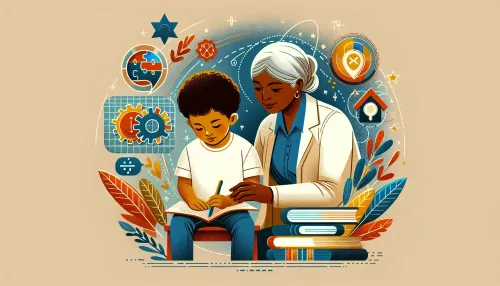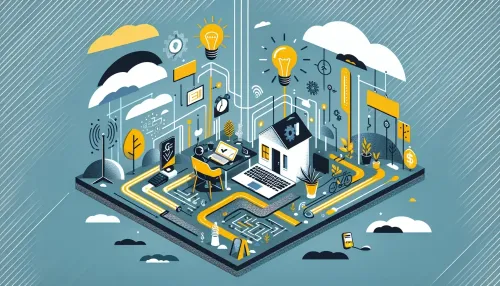Digital Transformation: Freelance Technology Solutions for Autism Therapy

Harnessing freelance technological expertise to enhance therapy options for autistic children
Autism spectrum disorder (ASD) presents unique challenges that require personalized and innovative therapy solutions. As the world embraces digital transformation, harnessing freelance technological expertise can revolutionize autism therapy, offering tailored, cost-effective, and accessible interventions. This article delves into the potential of integrating freelance tech consultants and developers into autism therapy, optimizing telehealth and virtual interventions, and promoting accessibility and affordability through freelance-driven advancements in autism therapy technology.
Understanding Digital Transformation in Autism Therapy
Traditional approaches to autism therapy often pose limitations in meeting individual needs due to their standardized nature. However, leveraging freelance technology solutions offers the opportunity to develop personalized interventions that cater to the diverse requirements of autistic children. Technology can be harnessed to create customized digital platforms, interactive tools, and adaptive devices, nurturing enhanced engagement and learning experiences for individuals on the autism spectrum.
Innovative Approaches to Personalized Autism Therapy
Integrating freelance expertise enables the creation of tailored applications and programs specifically designed to address the unique challenges faced by autistic children. These solutions can range from language development applications to sensory integration tools, empowering therapists and parents with innovative resources that are intricately aligned with the distinctive needs of each child.
Related Article: Rising Stars: Entrepreneurial Journeys of Autistic Teenagers
Benefits of Tailored Applications for Autistic Children
The synergy between freelance tech consultants and developers and the field of autism therapy fosters an environment of continuous innovation. Freelance professionals bring diverse skill sets, perspectives, and experiences to the table, catalyzing the development of groundbreaking solutions that compliment traditional therapeutic approaches.
By collaborating with freelance experts, therapists can gain access to a rich pool of specialized knowledge, such as augmented reality (AR) applications for social skills development or gamified learning platforms tailored for cognitive training. With freelance technology consultants and developers at the forefront, the realm of autism therapy becomes a hotbed for pioneering advancements designed to optimize outcomes for children on the spectrum.
Enhancing Therapy through Diverse Skill Sets
The advent of telehealth has reshaped the landscape of healthcare delivery, vividly impacting autism therapy. Through freelance technological contributions, telehealth strategies can be bolstered with innovative applications and platforms tailored to facilitate remote interventions with autistic children. These initiatives not only alleviate geographical barriers but also enhance the accessibility of therapy services for families residing in underserved areas.
Freelance professionals can revolutionize virtual interventions by crafting engaging teletherapy interfaces, incorporating virtual reality (VR) elements into therapy sessions, and developing user-friendly platforms that promote active participation from children with ASD. The amalgamation of technology-driven solutions and therapeutic expertise amplifies the potential for impactful interactions between therapists, children, and their families within virtual environments.
Advancements in Telehealth and Virtual Interventions
One of the defining attributes of leveraging freelance technology solutions in autism therapy is the potential to foster accessibility and affordability. Freelance contributions empower therapists and organizations to create cost-effective therapeutic tools, digital resources, and assistive technologies that cater to a broader demographic of autistic children.
Creating Engaging Teletherapy Experiences
Through open-source developments spearheaded by freelance professionals, affordable solutions such as sensory integration apps, communication devices, and behavior tracking systems can be readily accessible to families regardless of their financial constraints. Furthermore, freelance-driven advancements remove barriers often associated with proprietary technologies, allowing for the seamless dissemination of innovative autism therapy resources across diverse socio-economic backgrounds.
In conclusion, as the technological landscape continues to evolve rapidly, embracing freelance technological expertise stands as a pivotal catalyst in revolutionizing autism therapy. By leveraging the prowess of freelance tech consultants and developers, optimizing telehealth and virtual interventions, and prioritizing accessibility through freelance-driven advancements, the horizon for personalized, cost-effective, and inclusive autism therapy emerges as a beacon of hope for autistic children and their families. The transformative potential encapsulated within this collaborative synergy redefines the narrative surrounding autism therapy, ushering in a new era of innovative possibilities.
Frequently Asked Questions
Freelance technology solutions enhance autism therapy by providing personalized interventions tailored to individual needs. These solutions include customized digital platforms and interactive tools that improve engagement and learning experiences for autistic children, addressing their unique challenges effectively.
Freelance tech consultants bring diverse skills and innovative ideas to autism therapy. They collaborate with therapists to develop applications like augmented reality tools for social skills or gamified platforms for cognitive training, enhancing traditional therapeutic methods and improving outcomes for children.
Telehealth significantly reshapes autism therapy by facilitating remote interventions. Freelance professionals enhance telehealth strategies through innovative applications that remove geographical barriers, making therapy services more accessible for families, especially in underserved areas, thus broadening the reach of autism support.
Freelance advancements foster accessibility by creating cost-effective therapeutic tools and resources. These innovations, such as open-source sensory integration apps and communication devices, ensure that families from various socio-economic backgrounds can access essential autism therapy resources without financial constraints.
Technology developed for autistic children includes language development applications, sensory integration tools, and gamified learning platforms. These tailored solutions aim to address specific challenges faced by autistic individuals, enhancing their learning experiences and supporting their unique developmental needs.
Collaboration between therapists and freelance developers is crucial as it combines therapeutic expertise with technological innovation. This partnership leads to the creation of effective, customized solutions that enhance therapy outcomes, ensuring that interventions are both engaging and aligned with the needs of autistic children.
Check Out These Related Articles

Unveiling Expert Journeys: How a Renowned Child Psychologist Found Purpose in Autism Advocacy

From Parent to Professional Advocate: The Evolution of an Educational Specialist in Autism Care

Empowering Autistic Caregivers: The Rise of Freelance Specialists
